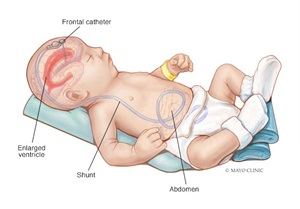Spine & Neurological Surgery
Hydrocephalus
Hydrocephalus is the buildup of fluid in the cavities (ventricles) deep within the brain. The excess fluid increases the size of the ventricles and puts pressure on the brain.
Cerebrospinal fluid normally flows through the ventricles and bathes the brain and spinal column. Cerebrospinal fluid plays an important role in brain function by:
- Keeping the brain buoyant, allowing the relatively heavy brain to float within the skull
- Cushioning the brain to prevent injury
- Removing waste products of the brain's metabolism
- Flowing back and forth between the brain cavity and spinal column to maintain a constant pressure within the brain — compensating for changes in blood pressure in the brain
Too much cerebrospinal fluid associated with hydrocephalus can damage brain tissues and cause a range of impairments in brain function. It can be caused by an obstruction in the normal flow, poor absorption of the fluid, or rarely the overproduction of fluid.
Hydrocephalus can happen at any age, but it occurs more frequently among infants and adults 60 and over. Surgical treatment for hydrocephalus can restore and maintain normal cerebrospinal fluid levels in the brain. Many different therapies are often required to manage symptoms or functional impairments resulting from hydrocephalus.
There are two primary surgical treatments used to treat hydrocephalus:
SHUNT

The most common treatment for hydrocephalus is the surgical insertion of a drainage system, called a shunt. It consists of a long, flexible tube with a valve that keeps fluid from the brain flowing in the right direction and at the proper rate. One end of the tubing is usually placed in one of the brain’s ventricles. The tubing is then tunneled under the skin to another part of the body where the excess cerebrospinal fluid can be more easily absorbed, such as the abdomen or a chamber in the heart.
ENDOSCOPIC THIRD VENTRICULOSTOMY
This is a surgical procedure that can be used for some people. In the procedure, your neurosurgeon uses a small video camera to have direct vision inside the brain. Your neurosurgeon makes a hole in the bottom of one of the ventricles or between the ventricles to enable cerebrospinal fluid to flow out of the brain.